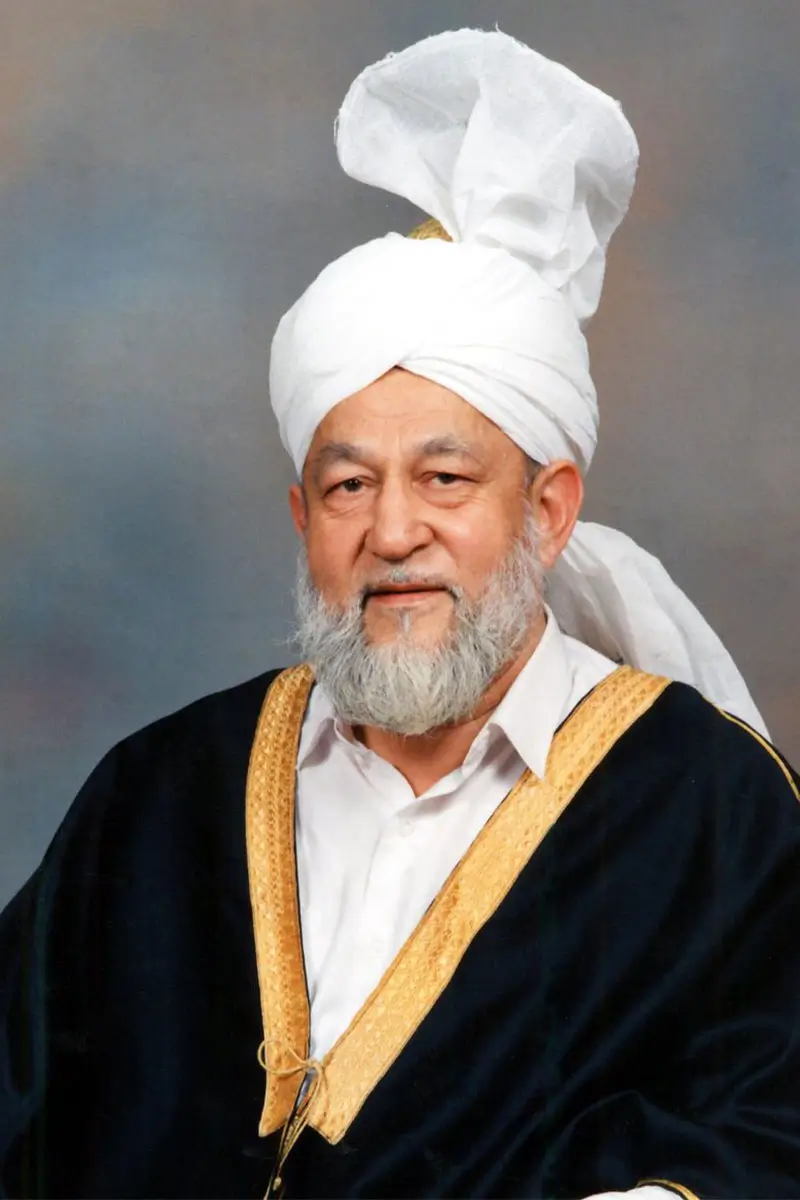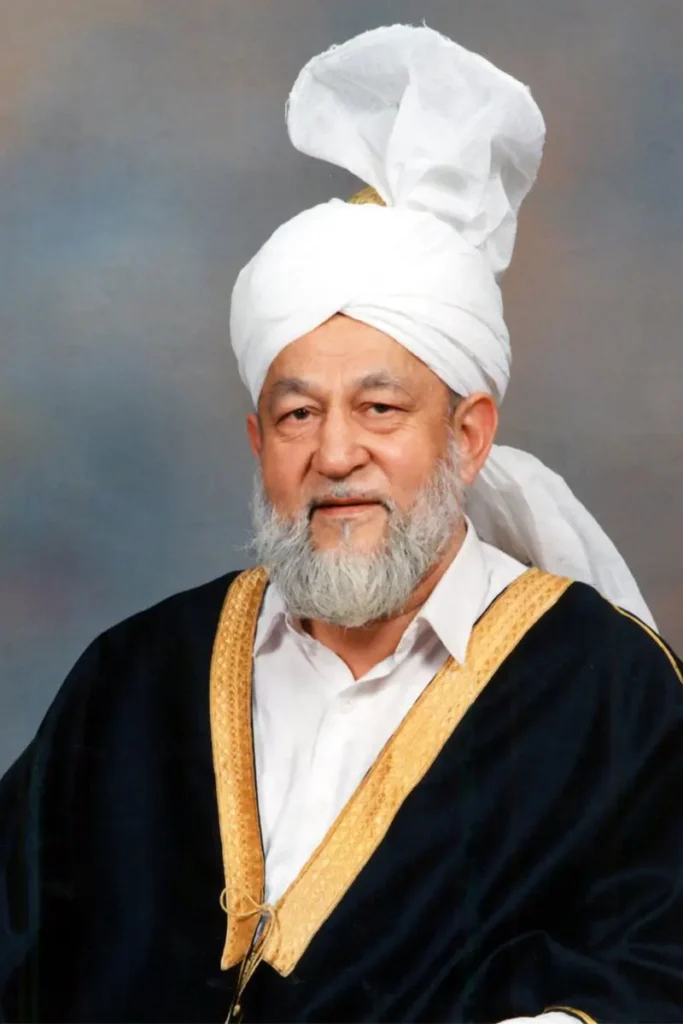Questioner: In Darood, the Dua after Darood Allahumma Salli ala Muhammad wa ala Ali Muhammad Kana Sallayt ala Ibrahim wa ala Ali Ibrahim Wa Barik ala Muhammad wa ala Ali Muhammad Kana Barakt ala Ibrahim wa ala Ali Ibrahim
اللهم صل على محمد وعلى آل محمد کما صليت على إبراهيم وعلى آل إبراهيم إنك حميد مجيد، اللهم بارك على محمد وعلى آل محمد کما باركت على إبراهيم وعلى آل إبراهيم إنك حميد مجيد
Could one infer from this that Ibrahim (as) has a higher status than the Holy Prophet salallahu alayhi wa sallam?
Huzoor (rh): No, کما (as) kamah, I have been discussing it at various other places in connection with other questions as well that کما (as) Kamah in Arabic neither indicates equality nor inferiority, nor superiority some resemblance justifies the use of کما (as) Kamah so it can work both ways or let’s say three ways کما (as) Kamah can be applied to a situation of similarity when the status is also equal it can be applied to a situation of similarity when the status of one person is higher than the other or vice versa for instance the Holy Quran tells us of the advent of Muhammad Mustafa sallallahu alayhi wa sallam by using the same word with reference to Hazrat Moses peace be upon him it says:
کَمَاۤ اَرۡسَلۡنَاۤ اِلٰی فِرۡعَوۡنَ رَسُوۡلًا(chapter: 73 Verse: 16)
(Tranlation: even as We sent a Messenger to Pharaoh)
so the same کما (as) Kamah appears there in the Holy Quran so if you understand it to indicate superiority then Moses should also be held as superior (نعوذ باللہ من ذالک), superior to the Prophet while he is not the same کما (as) Kamah is used and it indicates that some similarity is enough to justify the use of کما (as) Kamah so that similarity lies elsewhere and it has been explained in the ayat Khataman Nabiyyin Hazrat Ibrahim a.s. is known to be Abu’l-Ambiya the father of Prophets but he was not the true father of Prophets he is known to be there but the real father of Prophets was Hazrat Muhammad Mustafa sallallahu alayhi wa sallam so this is why when it was said by way of mocking that he had no male issue the Holy Quran reported by saying yes no male issue like people like you:
مَا کَانَ مُحَمَّدٌ اَبَاۤ اَحَدٍ مِّنۡ رِّجَالِکُمۡ
of course, he is not a father of people like you, men like you
وَلٰکِنۡ رَّسُوۡلَ اللّٰہِ وَخَاتَمَ النَّبِیّٖنَ
he is a father of much better people, of much higher order, all the Prophets belong to him, stand to him like children, like your sons stand to you in the same situation لٰکِنۡ lakin decides this issue that it has to be an answer fitting answer to the lack of sons and the other words provide that lack in some better way otherwise the usage of lakin would not be understandable if you translate it like the non-Ahmadis insist then the meaning would be reversed then the Holy Quran would appear to say, that you say he has no male issue yes we agree that he has neither a male issue like you nor would he ever have a spiritual issue because he has not only finished his material progeny he has also finished his spiritual progeny and no Prophet would be born as his subordinate, this is exactly an opposing situation completely, I mean completely contrary to the demand of the situation. So, by that verse I understand خَاتَمَ النَّبِیّٖنَ (seal of the prophets) who is a خَاتَمَ (seal), who leaves his stamp and it is always the father who leaves his stamp upon his offspring. So,Huzoor-e-Akram (sa) is described by the Holy Quran as the father of Prophets all Prophets were made by his stamp that is if you find his characteristics in some Prophets then they are true if you find contrary characteristics in some Prophets then they don’t have the support of Hazrat Muhammad Mustafa S.A.W. and they should be rejected as Prophets, nothing contrary to his character would be accepted in a Prophet, that is in essence the meaning of خَاتَمَ النَّبِیّٖنَ (seal of the prophets) and that is the philosophy of a son to his father. They say in English like a son like a father or things to that effect everywhere in the world knows I mean I am not talking genetically, genetically speaking ladies have at least half the share if not sometimes more but I am talking of the world of meanings as understood by human beings and by people everywhere in the world. Child bears the stamp of his father this is the meaning of fatherhood so this is the meaning of خَاتَمَ (seal) here and Hazrat Ibrahim (as) is erroneously understood to be the true father of انبیاء (prophets) erroneously in the sense that he was definitely not the father of Anbiya who preceded him but with because he was true spiritual father of انبیاء (prophets) not the literal father of انبیاء (prophets) as Hazrat Ibrahim was to send so many so this is why خَاتَمَ النَّبِیّٖنَ (seal of the prophets) as a verse lifted from time and made timeless and this was revealed somehow toHuzoor-e-Akram (sa) this is why he declares that I was a خَاتَمَ النَّبِیّٖنَ (seal of the prophets) when Adam was still in the offing he was turning in and out in the making of his mud, he says before that time I was خَاتَمَ النَّبِیّٖنَ (seal of the prophets) that indicates that even the first prophet was made with his stamp that is the characters which were to be fully developed in the Holy Prophet (sa) those were the characters which were taking shape in the early prophets and the Holy Prophet (sa) was a culmination of those characters so in that sense anyone who contained smaller characters but still stuck to those characters was like a son to him so that کما (as) I understand is not a کما (as) of equality or a superiority for Hazrat Ibrahim that کما (as) is just to indicate some similarity and this is one of those similarities








